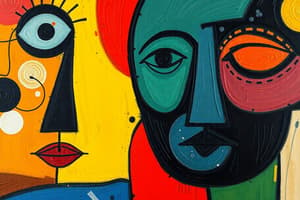Podcast
Questions and Answers
According to Karen Horney, what are neurotic needs?
According to Karen Horney, what are neurotic needs?
- Healthy manifestations of our natural human strivings.
- Needs that can only be fulfilled through external validation.
- External sources of human conflict like sexuality and power.
- Innate and universal desires that have become distorted or unhealthy due to experiences. (correct)
Which category of neurotic need involves a drive to exert influence and dominate others?
Which category of neurotic need involves a drive to exert influence and dominate others?
- Need for Power and Control (correct)
- Need for Love and Belonging
- Need for Achievement
- Need for Safety and Security
What is the primary source of human discomfort and neurosis according to Karen Horney?
What is the primary source of human discomfort and neurosis according to Karen Horney?
- External power sources
- Anxiety
- Sexuality
- Neurotic needs (correct)
How did Karen Horney view the manifestation of neurotic needs?
How did Karen Horney view the manifestation of neurotic needs?
Which need category reflects the fundamental desire to connect with others and form meaningful relationships?
Which need category reflects the fundamental desire to connect with others and form meaningful relationships?
How did Karen Horney categorize the types of needs that exist according to her theory of neurotic needs?
How did Karen Horney categorize the types of needs that exist according to her theory of neurotic needs?
What is the main focus of Horney's approach to treating neurotic needs?
What is the main focus of Horney's approach to treating neurotic needs?
According to Horney, what can happen if individuals develop unhealthy coping mechanisms to manage their internal needs?
According to Horney, what can happen if individuals develop unhealthy coping mechanisms to manage their internal needs?
What did Horney emphasize as crucial for overcoming unhealthy coping mechanisms?
What did Horney emphasize as crucial for overcoming unhealthy coping mechanisms?
How did Horney suggest individuals could fulfill their neurotic needs healthily?
How did Horney suggest individuals could fulfill their neurotic needs healthily?
What field has been influenced by Horney's focus on internal factors like anxiety and neurotic needs?
What field has been influenced by Horney's focus on internal factors like anxiety and neurotic needs?
What has Horney's emphasis on relationships and interpersonal dynamics contributed to in psychology?
What has Horney's emphasis on relationships and interpersonal dynamics contributed to in psychology?
Flashcards are hidden until you start studying
Study Notes
Karen Horney's Perspective on Neurotic Needs
Karen Horney, a prominent figure in the field of psychoanalysis, challenged some of Sigmund Freud's foundational concepts, especially his focus on sexuality and external power sources of human conflict. Instead, she emphasized internal factors like anxiety and the inherent needs that drive our behavior. In this exploration, we'll delve into Horney's theory of neurotic needs, which she argued are the primary sources of human discomfort and neurosis.
The Nature of Neurotic Needs
According to Horney, neurotic needs are not inherently bad but reflect our natural human strivings, which have become distorted or unhealthy due to our experiences and environment. These needs exist in four main categories:
- Need for Love and Belonging: A fundamental desire to connect with others and form meaningful relationships.
- Need for Safety and Security: A quest for stability, predictability, and protection.
- Need for Achievement: An urge to accomplish, succeed, and strive for recognition.
- Need for Power and Control: A drive to exert influence and dominate others.
Horney believed that these needs were innate and universal but argued that they often manifested in unhealthy ways, forming the foundations of neurotic behavior. For example, a person may compulsively seek approval to fulfill their need for love, even at the expense of their own self-respect.
The "Neurotic Cure"
Horney's approach to treating neurotic needs centered on fostering autonomy and self-acceptance. She maintained that people often develop unhealthy coping mechanisms to manage their internal needs, such as overly relying on others for love and security or striving for perfection to feel accomplished. These coping mechanisms, however, can become counterproductive in the long run, leading to further anxiety and neurotic behavior.
To overcome these unhealthy coping mechanisms, Horney emphasized the importance of self-understanding, self-respect, and self-reliance. She believed that individuals needed to recognize their neurotic needs, understand their origins, and learn how to fulfill them healthily. For example, instead of seeking approval from others, a person might learn to value their own opinions and decisions. By embracing self-acceptance, individuals could cultivate a more fulfilling and healthy sense of self.
The Influence of Horney's Theories
Horney's concepts have had a profound impact on the field of psychology and continue to inspire new theories and therapeutic approaches. In particular, Horney's focus on internal factors like anxiety and neurotic needs has provided valuable insights into the human psyche and has proven influential in the development of treatments such as self-psychology and cognitive-behavioral therapy.
Furthermore, Horney's emphasis on the role of relationships and interpersonal dynamics has contributed to the growth of social psychology and the development of therapeutic models like interpersonal psychotherapy. Her insightful exploration of the neurotic needs has also paved the way for further examination of the dynamics between personal needs, self-esteem, and emotional well-being.
In summary, Karen Horney's theory of neurotic needs offers a valuable and insightful perspective on human behavior and emotional well-being. Her work challenges traditional psychoanalytic theories and provides a unique framework for understanding how our innate human needs can become distorted and lead to neurotic behavior. By fostering self-understanding and self-acceptance, individuals can learn to fulfill their needs in healthier ways, leading to greater emotional well-being and personal growth.
Studying That Suits You
Use AI to generate personalized quizzes and flashcards to suit your learning preferences.




